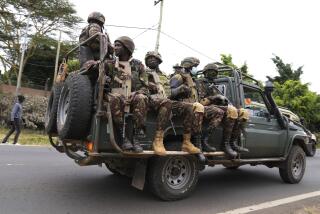At Least 7 Die Amid Rallies for Reform in Kenya
- Share via
NAIROBI, Kenya — At least seven people died in three Kenyan cities Monday in clashes with riot police during nationwide demonstrations for democratic reforms.
Police said four people were killed in Nyahururu, about 100 miles northwest of Nairobi, the capital: two men crushed to death when a crowd stampeded as police moved in to disperse it and two others shot by officers when a mob reportedly attempted to storm a bank.
A boy died in Nairobi en route to the hospital after he was found bleeding in a park, and another Nairobi-area resident was shot to death by an unidentified person. Witnesses said a seventh victim, a teenager, was gunned down by police in the town of Thika on the outskirts of the capital.
At least 50 pro-reform rallies were held in several major cities, in the latest sign that President Daniel Arap Moi’s days in power could be numbered. Elections are expected later this year, although no date has been announced.
Moi has ruled Kenya for 19 years, and organizers said they viewed Monday’s events--the largest and most violent confrontations in this country this year--as a turning point in Kenyan politics.
The rallies were organized by the National Convention Executive Council, a group of opposition parties, churches, and human and civil rights leaders who want the review or repeal of at least six colonial-era laws, including election rules they say favor Moi, who is seeking his fifth five-year term.
The reformists also want the repeal of a long-standing law that permits indefinite detention of individuals without trial, and they advocate the scrapping of the Public Order Act, which allows police to use force to break up unlicensed rallies. They also want greater access to state-controlled media.
“The government should allow the opposition parties to give the message they have to the citizens of Kenya,” said Kimani Kangethe, acting national chairman of the Kenya National Democratic Alliance, as he wiped his streaming eyes, which were burning from the effects of tear gas. “Now we are deprived of that right. People who speak against the government are silenced.”
In Nairobi, about 400 demonstrators gathered peacefully in central Uhuru Park, the main venue for Monday’s rallies here. Scores of police on foot and on horseback charged the crowd, ordering people to disperse.
Many ran; others stood their ground. Some began to walk away, only to be clobbered with wooden police bats. Muturi Kigano, chairman of the unregistered Safina opposition party, was kicked and clubbed and fell writhing on the grass in the park. He was later hospitalized.
Riot police had earlier stormed the capital’s All Saints Anglican cathedral, smashing pews with truncheons and clubbing people who had gathered inside to attend a service. Outside, protesters chanted “No reforms, no election” and “Moi must go!”
Later in the day, students at the main campus of the University of Nairobi also fought with police, who the students said had fired tear gas into a classroom where dozens sat taking an exam.
*
Most shops in Nairobi’s downtown business district closed by lunchtime as owners heeded warnings from both sides that their stores might be the targets of looters during the long-planned protests. Some did not open at all. Car dealers removed their vehicles from display windows. At some businesses, employees had spent the weekend barricading their property with boards and wrought-iron grilles.
Nairobi’s typical bumper-to-bumper traffic was reduced to a trickle. Organizers in some cities had urged residents to stay in and keep children home from school as a show of support for the demonstrators.
Over the weekend, Kenyan state radio had warned people against attending what it called “outlawed” demonstrations. The Federation of Kenya Employers threatened to fire any of its workers who stayed off the job to attend or support the protests.
Unemployed Kimani Kamau, 24, said that even if he had a job, he would have skipped work to participate in Monday’s events. “Our ancestors fought for freedom from white colonizers,” he said. “Now we are asking for the second liberation of Kenya.”
Ndola Ayah, national chairman of the ruling Kenya African National Union, condemned Monday’s rallies as “a plan by the opposition to disrupt normal business and endanger lives of innocent citizens.”
Moi has charged his opponents with attempting to throw the country into chaos.
The rallies were illegal, government officials stressed, because organizers had not obtained permits. Opposition leaders said the long-standing permit requirement is the government’s way of trying to muzzle dissent.
Opposition leaders have accused the government of “renting” thugs to loot shops and beat peaceful rally-goers in hopes of discrediting the opposition and pitting the public against the demonstrators.
The 73-year-old president recently threatened to withdraw the operating permit of the National Council of Non-Governmental Organizations--an umbrella group of NGOs in Kenya--which he has accused of diverting funds meant for community service to finance subversive activities.
On Saturday, Kenya’s three main newspapers carried reports that they had been given an unsigned document, allegedly written by pro-reform sympathizers, describing a plot to unseat the Moi government and foment anarchy. The document reportedly included strategies for inciting civil disobedience and instructions for using the media “to cause unprecedented disaffection” among the public.
Reform activists dismissed reports of such a publication as false and probably fabricated by Moi supporters.
More to Read
Sign up for Essential California
The most important California stories and recommendations in your inbox every morning.
You may occasionally receive promotional content from the Los Angeles Times.











